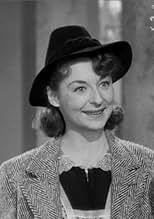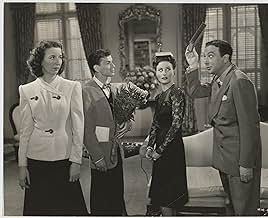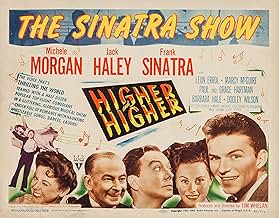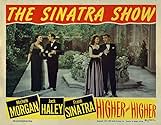Aggiungi una trama nella tua linguaWith their employer bankrupt, servants scheme to marry maid Millie to a rich husband. But Frank Sinatra lives across the street...With their employer bankrupt, servants scheme to marry maid Millie to a rich husband. But Frank Sinatra lives across the street...With their employer bankrupt, servants scheme to marry maid Millie to a rich husband. But Frank Sinatra lives across the street...
- Regia
- Sceneggiatura
- Star
- Candidato a 2 Oscar
- 2 candidature totali
Michèle Morgan
- Millie Pico
- (as Michele Morgan)
Robert Andersen
- Announcer at Butler's Ball
- (non citato nei titoli originali)
Paul Bradley
- Wedding Guest
- (non citato nei titoli originali)
Ralph Brooks
- Restaurant Customer
- (non citato nei titoli originali)
Tanis Chandler
- Debutante
- (non citato nei titoli originali)
Recensioni in evidenza
As a stage play it must have been a hilarious farce, as a film with a
truly great cast it is very funny indeed. To have all those appealing
character actors like Mary Wickes and Victor Borge along with
headliners like Sinatra and Jack Haley all set in a well furnished
RKO mansion adding crooner Mel Torme and a few excellent
songs: "I saw you first" and "A lovely way to spend an evening" and
a good situation comedy storyline, HIGHER AND HIGHER is great
fun. There is a wide range to the tunes too, with some hep jive
from Marcie and Mel and crooner swooner from Frank.....and on a
bicycle too. Sinatra would have been 28 when he made this and
his visual appeal is also undeniable. Good 40s musical stage to
film adaptation.
truly great cast it is very funny indeed. To have all those appealing
character actors like Mary Wickes and Victor Borge along with
headliners like Sinatra and Jack Haley all set in a well furnished
RKO mansion adding crooner Mel Torme and a few excellent
songs: "I saw you first" and "A lovely way to spend an evening" and
a good situation comedy storyline, HIGHER AND HIGHER is great
fun. There is a wide range to the tunes too, with some hep jive
from Marcie and Mel and crooner swooner from Frank.....and on a
bicycle too. Sinatra would have been 28 when he made this and
his visual appeal is also undeniable. Good 40s musical stage to
film adaptation.
Cyrus Drake is a rich businessman who has had his staff of servants for many years a situation that is put a risk when bad investments bankrupt him and threaten to put his loyal staff on the street. To bring money back into the family again, the servants plan to marry off the youngest maid, Millie to a rich man. The staff all pick their roles to establish the ruse, while Millie starts being taught how to be a well educated debutante. However their plans are endangered when singer Frank Sinatra moves in next door and Millie tries to hide her affection for fellow servant Michael.
Billed as a Frank Sinatra film now, really this is a standard romance of the time, which features Frank in a small role as himself in order to get the teenage crowd in the doors (and they say cynical marketing at teens is a recent thing!). Ignoring this role the film is very much an ordinary piece of entertainment that was very much of the period a piece of fluff with a convoluted plot, musical numbers, misunderstandings and true love finding a way by the end. In this regard it is OK but quite average, with no real laughs, no significantly moving moments and nothing that really stands out. The script allows for enough to go on to keep the interest but it is all pretty thin and gradually slips into nothingness with only frequent and lively musical numbers serving to keep boredom at bay. The silly twist towards the end is a good example of how lazy the scriptwriters were basing their happy ending on the thinnest of plot devices.
The cast are mostly OK a mix of romantic parts and fast-talking characters. Sinatra didn't do that well playing himself and he looked uncomfortable like he had been forcibly inserted into the film and felt unwelcome. He got better with time but here he is pretty wooden. Morgan is likable as Millie and Haley enjoys himself with the sort of character that usually plays the sidekick as opposed to his lead role here. Support from Errol, Wickes and an early role from a beautiful Hale (best known as Della Street to my generation) are all good value and help the material appear more interesting and lively than it actually is.
Overall this is very much of its period and it is an average at that. Sinatra may not actually add much on screen but his name made it a bigger film than it could have been and ensures that it gets repeated on television quite often when others have been forgotten. As afternoon television filler it does the job but it is a wholly unremarkable film even with the presence of Sinatra and I imagine that, without his involvement that it would have long since been forgotten.
Billed as a Frank Sinatra film now, really this is a standard romance of the time, which features Frank in a small role as himself in order to get the teenage crowd in the doors (and they say cynical marketing at teens is a recent thing!). Ignoring this role the film is very much an ordinary piece of entertainment that was very much of the period a piece of fluff with a convoluted plot, musical numbers, misunderstandings and true love finding a way by the end. In this regard it is OK but quite average, with no real laughs, no significantly moving moments and nothing that really stands out. The script allows for enough to go on to keep the interest but it is all pretty thin and gradually slips into nothingness with only frequent and lively musical numbers serving to keep boredom at bay. The silly twist towards the end is a good example of how lazy the scriptwriters were basing their happy ending on the thinnest of plot devices.
The cast are mostly OK a mix of romantic parts and fast-talking characters. Sinatra didn't do that well playing himself and he looked uncomfortable like he had been forcibly inserted into the film and felt unwelcome. He got better with time but here he is pretty wooden. Morgan is likable as Millie and Haley enjoys himself with the sort of character that usually plays the sidekick as opposed to his lead role here. Support from Errol, Wickes and an early role from a beautiful Hale (best known as Della Street to my generation) are all good value and help the material appear more interesting and lively than it actually is.
Overall this is very much of its period and it is an average at that. Sinatra may not actually add much on screen but his name made it a bigger film than it could have been and ensures that it gets repeated on television quite often when others have been forgotten. As afternoon television filler it does the job but it is a wholly unremarkable film even with the presence of Sinatra and I imagine that, without his involvement that it would have long since been forgotten.
When the household staff of a wealthy family find out that their employers have gone broke, they concoct a dubious scheme: have new maid Millie (Michele Morgan) pretend to be the daughter of the rich family long enough to wed a wealthy suitor and get her hands on his money, after which she'll pay the other servants handsomely. Butler Michael (Jack Haley) manages the scheme despite having feelings for Millie himself, while next door neighbor Frank Sinatra (Frank Sinatra) keeps popping over to hit on Millie, as well as sing a few tunes.
The story is minor, and the humor thin, but it was fun seeing so many later major stars in early roles. Mel Torme looks like he's about 13 years old, Barbara Hale is youthful yet still mature, and Victor Borge is a long way from the goofball that I used to see on PBS so often in the 70's and 80's. The real draw is Sinatra, of course, playing a version of himself. He sings several songs, but doesn't have much acting to do. He's very thin and looks like he's wearing a suit 3 sizes too big. One of his songs earned an Oscar nomination for Best Song ("I Couldn't Sleep a Wink Last Night"), as did the film's score by C. Bakaleinikoff.
The story is minor, and the humor thin, but it was fun seeing so many later major stars in early roles. Mel Torme looks like he's about 13 years old, Barbara Hale is youthful yet still mature, and Victor Borge is a long way from the goofball that I used to see on PBS so often in the 70's and 80's. The real draw is Sinatra, of course, playing a version of himself. He sings several songs, but doesn't have much acting to do. He's very thin and looks like he's wearing a suit 3 sizes too big. One of his songs earned an Oscar nomination for Best Song ("I Couldn't Sleep a Wink Last Night"), as did the film's score by C. Bakaleinikoff.
Higher and Higher was one of Rodgers&Hart's lesser Broadway musicals it only had a run of 84 performances on Broadway in 1940. Yet it yielded one of their bigger hits It Never Entered My Mind.
Nevertheless except for one minor song, So Disgustingly Rich, the entire Broadway score was scrapped when RKO bought the film rights. Instead a whole new score by Jimmy McHugh and Harold Adamson was written, mostly to accommodate one Francis Albert Sinatra who was making his feature film debut.
Sinatra who had done some vocal cameos in previous films, takes a leaf from the page of his singing rival Bing Crosby. When Bing did his feature film debut in The Big Broadcast, he played Bing Crosby. Frank Sinatra took on the role of Frank Sinatra and I can't think of anyone who could have done a better job.
The Chairman of the Board is billed third here behind stars Jack Haley and Michele Morgan. He's the butler and she's the scullery maid to Leon Errol. In fact Errol is a millionaire who hasn't paid his help for seven months. Mainly because he's about to go belly up into chapter 11 or so he informs the staff.
Errol's a delightful old soul to work for and none of the staff want to lose a good thing. They pool their resources and get Michele Morgan to impersonate Errol's daughter who's over in Switzerland with her mother. The idea being to snag a rich bankroll in the hopes rescuing the family fortune. Only Michele starts looking at another.
It's a slight plot and certainly no worse than a whole lot of musicals, but RKO invested this film with a good cast of players. Barbara Hale and Elizabeth Risdon play another débutante and her mother who suspect something's not right, Victor Borge is a fortune seeking no account, Dooley Wilson, Paul Hartman, Grace Hartman, Marcy McGuire, Mel Torme and Mary Wickes, play others of the Errol household staff. Not a bad bunch at all.
Sinatra sang three good ballads all of them had some kind of commercial success, The Music Stopped, A Lovely Way to Spend an Evening, and I Couldn't Sleep a Wink Last Night. The last one was nominated for an Oscar for Best Song, but lost to Alice Faye's You'll Never Know.
1943 was the year of the Musician's Union Strike against the recording industry. To get their material out, Frank Sinatra recorded the songs from Higher and Higher with an acapella chorus for Columbia. Bing Crosby recorded songs from his film Dixie in the same manner for Decca. Both of them were denounced by the president of the union, James C. Petrillo as strikebreakers and both did not cross the picket line again. The strike wasn't settle completely until 1944 although Decca broke ranks earlier from the other record companies and settled earlier than Columbia, RCA Victor and the others.
The strike provided some anxious moments for Sinatra. He had just left the Tommy Dorsey Orchestra when the strike was called. It closed off a needed venue for his artistry when he wasn't sure whether leaving Dorsey would prove to be a right career move.
Fortunately Higher and Higher was received well a legend was launched.
Nevertheless except for one minor song, So Disgustingly Rich, the entire Broadway score was scrapped when RKO bought the film rights. Instead a whole new score by Jimmy McHugh and Harold Adamson was written, mostly to accommodate one Francis Albert Sinatra who was making his feature film debut.
Sinatra who had done some vocal cameos in previous films, takes a leaf from the page of his singing rival Bing Crosby. When Bing did his feature film debut in The Big Broadcast, he played Bing Crosby. Frank Sinatra took on the role of Frank Sinatra and I can't think of anyone who could have done a better job.
The Chairman of the Board is billed third here behind stars Jack Haley and Michele Morgan. He's the butler and she's the scullery maid to Leon Errol. In fact Errol is a millionaire who hasn't paid his help for seven months. Mainly because he's about to go belly up into chapter 11 or so he informs the staff.
Errol's a delightful old soul to work for and none of the staff want to lose a good thing. They pool their resources and get Michele Morgan to impersonate Errol's daughter who's over in Switzerland with her mother. The idea being to snag a rich bankroll in the hopes rescuing the family fortune. Only Michele starts looking at another.
It's a slight plot and certainly no worse than a whole lot of musicals, but RKO invested this film with a good cast of players. Barbara Hale and Elizabeth Risdon play another débutante and her mother who suspect something's not right, Victor Borge is a fortune seeking no account, Dooley Wilson, Paul Hartman, Grace Hartman, Marcy McGuire, Mel Torme and Mary Wickes, play others of the Errol household staff. Not a bad bunch at all.
Sinatra sang three good ballads all of them had some kind of commercial success, The Music Stopped, A Lovely Way to Spend an Evening, and I Couldn't Sleep a Wink Last Night. The last one was nominated for an Oscar for Best Song, but lost to Alice Faye's You'll Never Know.
1943 was the year of the Musician's Union Strike against the recording industry. To get their material out, Frank Sinatra recorded the songs from Higher and Higher with an acapella chorus for Columbia. Bing Crosby recorded songs from his film Dixie in the same manner for Decca. Both of them were denounced by the president of the union, James C. Petrillo as strikebreakers and both did not cross the picket line again. The strike wasn't settle completely until 1944 although Decca broke ranks earlier from the other record companies and settled earlier than Columbia, RCA Victor and the others.
The strike provided some anxious moments for Sinatra. He had just left the Tommy Dorsey Orchestra when the strike was called. It closed off a needed venue for his artistry when he wasn't sure whether leaving Dorsey would prove to be a right career move.
Fortunately Higher and Higher was received well a legend was launched.
This is one of my all-time favorites. Great music and some funny bits. I laugh every time at Millie, the maid pretending to be a débutante, holding her dainty hankie while chatting, and mindlessly polishing furniture with it as she chats. I just never can get past her French accent never being a problem as they try to pass her off as the boss's daughter.
Seeing a teenage Mel Torme and the very young Frank Sinatra singing is such a treat. My mom saw Frank Sinatra at a theater about the same time this movie came out. She said they couldn't clear the "bobby-soxers" out between movies (in those days you didn't have to leave between showings). This movie shows you how attractive and appealing the young Frank was and allows you to appreciate his early talent as well. And Victor Borge gets in a bit of his routine in, which is a bonus.
This is a fun movie with a sweet, simple storyline. Very enjoyable.
Seeing a teenage Mel Torme and the very young Frank Sinatra singing is such a treat. My mom saw Frank Sinatra at a theater about the same time this movie came out. She said they couldn't clear the "bobby-soxers" out between movies (in those days you didn't have to leave between showings). This movie shows you how attractive and appealing the young Frank was and allows you to appreciate his early talent as well. And Victor Borge gets in a bit of his routine in, which is a bonus.
This is a fun movie with a sweet, simple storyline. Very enjoyable.
Lo sapevi?
- QuizRKO purchased the rights to the play for $15,000 ($254,000 in 2022), specifically to star Frank Sinatra, and the four songs he sings by Jimmy McHugh and Harold Adamson were written to accommodate his singing style. He was billed third because the contracts with Michèle Morgan and Jack Haley prevented higher billing.
- BlooperDuring the song "when it comes to love you're on your own" (c.62 minutes) the doorways have no panes of glass in them on the lower rows, as the house staff join in the song.
- Citazioni
Mr. Green: Lovely thing you're playing, Victor. What is it?
Sir Victor Fitzroy Victor: It's a piano.
- Colonne sonoreIt's a Most Important Affair
(1943) (uncredited)
Written by Jimmy McHugh
Lyrics Harold Adamson
Sung by Mel Tormé, Marcy McGuire, Paul Hartman, Grace Hartman,
Martha Mears, Dooley Wilson, and Ivy Scott
I più visti
Accedi per valutare e creare un elenco di titoli salvati per ottenere consigli personalizzati
- How long is Higher and Higher?Powered by Alexa
Dettagli
- Data di uscita
- Paese di origine
- Lingua
- Celebre anche come
- Il denaro non è tutto
- Luoghi delle riprese
- Azienda produttrice
- Vedi altri crediti dell’azienda su IMDbPro
Botteghino
- Budget
- 600.000 USD (previsto)
- Tempo di esecuzione1 ora 30 minuti
- Colore
- Proporzioni
- 1.37 : 1
Contribuisci a questa pagina
Suggerisci una modifica o aggiungi i contenuti mancanti

Divario superiore
By what name was Higher and Higher (1943) officially released in India in English?
Rispondi

































